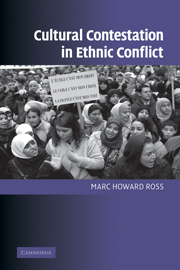Book contents
- Frontmatter
- Contents
- List of figures
- Preface
- 1 Introduction: easy questions and hard answers, what are they fighting about?
- 2 The political psychology of competing narratives
- 3 Narratives and performance: ritual enactment and psychocultural dramas in ethnic conflict
- 4 Loyalist parades in Northern Ireland as recurring psychocultural dramas
- 5 Where is Barcelona? Imagining the nation without a state
- 6 Digging up the past to contest the present: politics and archeology in Jerusalem's Old City
- 7 Dressed to express: Islamic headscarves in French schools
- 8 The politics of memory and memorialization in post-apartheid South Africa
- 9 Enlarging South Africa's symbolic landscape
- 10 Flags, heroes, and statues: inclusive versus exclusive identity markers in the American South
- 11 Culture's central role in ethnic conflict
- References
- Index
- Cambridge Cultural Social Studies
1 - Introduction: easy questions and hard answers, what are they fighting about?
Published online by Cambridge University Press: 22 September 2009
- Frontmatter
- Contents
- List of figures
- Preface
- 1 Introduction: easy questions and hard answers, what are they fighting about?
- 2 The political psychology of competing narratives
- 3 Narratives and performance: ritual enactment and psychocultural dramas in ethnic conflict
- 4 Loyalist parades in Northern Ireland as recurring psychocultural dramas
- 5 Where is Barcelona? Imagining the nation without a state
- 6 Digging up the past to contest the present: politics and archeology in Jerusalem's Old City
- 7 Dressed to express: Islamic headscarves in French schools
- 8 The politics of memory and memorialization in post-apartheid South Africa
- 9 Enlarging South Africa's symbolic landscape
- 10 Flags, heroes, and statues: inclusive versus exclusive identity markers in the American South
- 11 Culture's central role in ethnic conflict
- References
- Index
- Cambridge Cultural Social Studies
Summary
What are long-term ethnic conflicts about? How do they develop? Why are they so intense and hard to settle? Why do opposing sides view and describe what are ostensibly the same events so differently? How does identity shape why and how ethnic conflict is waged? What do good settlements look like?
Over the past thirty years, political analyses have offered very diverse answers to these apparently straightforward questions. In general, political scientists approaching ethnic conflict have focused on the interests motivating contending groups and the strategies by which these interests are pursued. Some answers from this perspective are interesting and non-obvious. On the whole, however, they are partial, and fail to address some important issues, thereby limiting our understanding of ethnic conflict and its management. For example, most existing work has little to say about how interests are developed and defined in different societies. In addition, there is little effort to deal with the puzzles that arise when what are apparently the same competing interests in two different settings result in intense conflict and violence in one but not the other. Often, interest-based accounts cannot explain why hypothesized preconditions for intense conflict, such as ethnic group inequalities, produce high conflict in some places but very little in others. Nor do they help us understand why some societies with relatively little intergroup inequality, such as Northern Ireland, have a great deal of conflict and violence, while others with high inequalities, such as post-apartheid South Africa, have far less intergroup conflict than many expected.
- Type
- Chapter
- Information
- Cultural Contestation in Ethnic Conflict , pp. 1 - 29Publisher: Cambridge University PressPrint publication year: 2007



